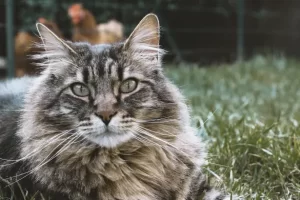
Have you ever come home after a long day to find that your beloved cat is squinting their nose in disgust? Or perhaps they’re crouching down low, as if they don’t want anything to do with whatever it is that smells so bad? Believe it or not, cats really do have some powerful senses of smell. In fact, when something smells offensive to them, they’ll make sure everyone knows about it. But what causes cats to hate certain smells and how can we prevent these reactions from happening? In this blog post, I’m going to explore why cats are sensitive to scents, what smells the cats hate and what you can do as an owner of a feline friend when there’s an offending odor.
17 Smells That Cats Hate
1. Essential oils
Cats hate Essential oils smell, as the smell can often be overwhelming for them and may cause respiratory problems. Essential oils are also toxic if ingested, so it is best to use caution when using them in the presence of cats. Additionally, some essential oils have been known to contain compounds that can be harmful to cats.
2. Hot peppers
Cats hate Hot peppers smell. They may even become agitated and try to get away from it. If a cat gets too close to a Hot pepper plant, she could be burned by the capsaicin oils in the peppers. It’s best to keep cats and Hot peppers separated, as some cats can become very distressed when exposed to these hot smells.
3. Herbs and plants
Cats have a very sensitive sense of smell and their noses can pick up on the scents of herbs and plants. Unfortunately, cats don’t usually appreciate the smell of these items, so they may avoid areas where strong smells are present. If you want to keep your cat away from certain herbs and plants, it’s best to make sure that they are kept in an area where the smell isn’t too overwhelming for your pet.
4. Ground coffee
Cats have an incredibly sensitive nose and can easily detect a strong coffee smell. In fact, cats can even distinguish between different types of coffee beans. This is why cats often show distaste for the smell of ground coffee. The strong coffee aroma can be overpowering and unpleasant to cats, causing them to feel overwhelmed and uncomfortable.
5. Grapefruit
One of the main reasons why cats hate the smells of grapefruit is because it can be quite strong and unpleasant for them. Cats generally have a heightened sense of smell, which means that even a faint scent can be overwhelming or unappealing to them.
6. Lavender
Smell of lavender can be overwhelming for cats’ sensitive noses. Lavender contains a number of compounds that produce an intense perfume-like scent, which cats find particularly unpleasant.
7. Rosemary
Rosemary has a strong scent that can be overwhelming for cats, and its strong herbaceous aroma can be unpleasant or even painful for them to inhale. The volatile oils in the plant are especially potent and could irritate their noses or throats.
8. Thyme
Cats have a highly developed sense of smell, and they can detect odors that humans cannot. The strong odor of thyme has been known to be off-putting for cats, as it can be too intense for them. Cats can also find the aroma of this herb unpleasant and may try to avoid areas with a heavy concentration of it.
9. Citrus
Cats have an incredible sense of smell and will immediately turn their noses away from anything citrus-scented. This includes lemons, limes, oranges, grapefruits, etc.
10. Vinegar
The pungent aroma of vinegar is one that cats cannot stand and even a small whiff might make them sneeze or run away.
11. Alcohol
Cats’ sense of smell is significantly more sensitive than ours; therefore, even the slightest whiff of an alcoholic beverage can be overwhelming for them. Additionally, the scent of ethanol can cause confusion in cats as it does not correspond with something that they would normally be familiar with.
12. Mint
Mint has a strong odor that cats find unpleasant. Cats are sensitive to smells and pungent odors can be off-putting to them. The smell of mint is especially intense, and many cats will go out of their way to avoid it. In addition to the smell, the dominant taste of menthol in mint may even make cats feel itchy or uncomfortable.
13. Garlic & Onion
Cats hate smells coming from Both garlic and onion because they are pungent and have an extremely strong smell. Cats will immediately be turned off by their scent and may become aggressive or defensive if exposed to them for too long. Cats have a very sensitive sense of smell, which is much stronger than humans. Cats are naturally repelled by these strong scents because they can be overwhelming and irritating for them.
14. Cigarette Smoke
Cats are particularly sensitive to cigarette smoke due to their heightened sense of smell. Cats have a much more acute sense of smell than humans, and this can make the strong odor of cigarette smoke overwhelming for them. The chemicals and particles that compose cigarette smoke contain toxins which can be irritating to cats’ delicate respiratory systems.
15. Dirty litter box
Just like us human hate a dirt bathroom, Cats hate bad odor smells coming from their litter boxes. Cats are highly sensitive to odors and smells, which means that they can easily be put off by a litter box with an unpleasant odor and offensive to their nose. Dirty litter boxes create an ammonia-like smell which cats find particularly offensive.
16. Synthetic Materials
Cats dislike the smell of synthetic materials because they are not natural and don’t mimic any scent familiar to cats. Cats use their sense of smell to identify their environment, so when a material has a strong, artificial odor it can be off-putting for them. Synthetic materials like fabric and plastic often contain chemicals that emit an unpleasant smell to cats.
17. Strong Detergents & Cleaners
Cats have an incredibly sensitive sense of smell and strong detergents and cleaners can be overwhelming for them. The sharp, chemical smells that come from these products can be off-putting for cats and drive them away. Not only do the fragrances irritate their noses, but the fumes of certain cleaning supplies are known to cause respiratory irritation in cats.
Understanding a Cat’s Sense of Smell
Cats have an excellent sense of smell, and they use it to navigate the world around them. Cats have a far greater number of scent-detecting cells in their noses than humans do, making their sense of smell about 14 times stronger than ours. They can detect pheromones, the odors that other cats leave behind, which helps them identify one another. Cats also rely on their sense of smell to recognize familiar people and places.
The olfactory system is used by cats not only as a means of recognizing things but also to aid in finding prey. When hunting, they often rely on their keen senses to detect even minute odors that signal the presence of food or potential danger nearby. Likewise, cats also use their sense of smell to create a mental map of their environment, which allows them to navigate safely in the dark or in unfamiliar places.
Cats also take advantage of their heightened sense of smell when it comes to grooming. They will frequently lick themselves to spread natural oils across their fur that help mask their scent and make them less visible to predators. In addition, cats will rub themselves against various surfaces as another way of spreading these scents and establishing territorial boundaries with other cats.
Cats’ superior sense of smell gives them many useful abilities both in terms of survival and pleasure. It allows them to detect potential prey, recognize familiar people and places, put together a mental map while navigating through unfamiliar territory, and establish boundaries with other cats. While some of these abilities are instinctive, it is also important to provide cats with proper grooming so they can take full advantage of their sense of smell. This helps ensure that your cat remains healthy and safe.
How to make your home more appealing to your cat’s sense of smell
An important part of making your home more appealing to your cat’s sense of smell is to keep it clean. Cats have a very sensitive sense of smell and are easily put off by strong, unpleasant odors. This means you should regularly vacuum and dust the surfaces in your home to remove any dirt or pet dander that might be present in the air. You may also want to consider purchasing special cleaning supplies that are specifically made for removing pet odors from carpets, furniture, and fabrics.
Another way to make your home more inviting for cats is to provide them with an area wherein they can explore different scents. You can do this by placing items like catnip toys or scratching posts around the house in areas that are easily accessible. Cats love to explore and investigate new scents, so having these items around the house can help keep them occupied and entertained while they’re indoors.
The benefits of using a cat-scented air freshener
The benefits of using a cat-scented air freshener to promote a sense of relaxation are plentiful. Not only can it help to create an atmosphere of calm, but the pleasant aroma can also help to reduce stress and anxiety levels. Additionally, the scent is thought to have a positive effect on pet owners, as it can bring back memories of their beloved cats. Cat-scented air fresheners may also be beneficial for people suffering from allergies or asthma, as some studies suggest that the scents may reduce dust particles in the air. Finally, using cat-scented air fresheners can be an effective way to keep your home smelling fresh without resorting to harsh chemical odors or aerosol sprays.
Conclusion
It’s well known that cats can often be picky about their sensory preferences, but one thing that stands out is the intensity with which they express their dislike for certain smells. Cats have a much more sensitive sense of smell than humans do and as a result, even mildly strong odors can be off-putting to them. For example, popular scents like citrus, lavender or peppermint can easily overwhelm a cat and make them recoil in disgust. On the other hand, they may love the smells of freshly opened cans of tuna or wet grass after a summer rainstorm.


